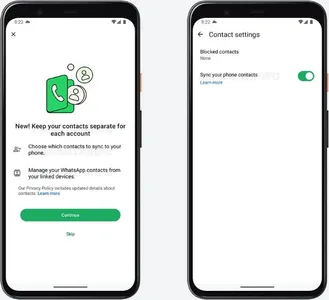In an era where seamless connectivity and privacy are paramount, WhatsApp continues to innovate by enhancing user experience and security. The popular messaging platform is rolling out two highly anticipated features: contact syncing for multiple accounts and passkey encryption for backups. These updates are set to redefine how users manage their contacts and secure their conversations. In this blog, we’ll explore these new features in detail, highlighting their functionalities, benefits, and implications for WhatsApp users.
Understanding WhatsApp’s New Multi-Account Contact Syncing Feature
WhatsApp is known for its ease of use and robust privacy features, but until recently, it lacked support for managing multiple accounts efficiently. This limitation posed a challenge for users who wanted to keep their work and personal lives separate or who used different numbers for various purposes. Recognizing this need, WhatsApp announced a multi-account feature, enabling users to operate multiple WhatsApp accounts on the same device.
With the multi-account feature already generating buzz, WhatsApp is now focusing on improving how users can manage their contacts across these multiple accounts. The new contact syncing feature is a significant enhancement that gives users more control over how their contacts are synced and managed.
What is Contact Syncing?
Contact syncing refers to the process of updating and managing contacts across different devices and accounts. In the context of WhatsApp’s new feature, it means that users will be able to control how contacts are synced for each of their WhatsApp accounts independently. This independence allows for a more organized and tailored contact management experience, particularly for users who have distinct needs for different accounts.
How Will the New Contact Syncing Feature Work?
According to reports from WABetaInfo, a trusted source for WhatsApp updates, the new contact syncing feature is designed with flexibility in mind. Here’s how it will work:
- Independent Syncing for Each Account: Users will be able to decide how contacts are synced for each account individually. For instance, a user might choose to sync their personal contacts with their primary WhatsApp account while keeping their work contacts separate on a secondary account. This granular control means that users won’t have to sync their entire address book across all accounts, offering a cleaner and more organized interface.
- Manual Sync Option: Even if users opt to disable automatic contact syncing for a particular account, WhatsApp will provide a manual sync option. This means users can choose to sync specific contacts from their address book to their desired account whenever needed. This option is ideal for users who want to keep certain contacts private or separate from their main address book.
- Unsyncing Contacts: Flexibility extends to unsyncing as well. If a user decides they no longer want a contact to be synced across their devices, they can unsync that contact with ease. This feature is particularly useful for maintaining privacy and ensuring that sensitive contacts remain confidential.
- Backup Integration: Synced contacts will also be backed up if the user chooses to enable the new contact backup option from their privacy settings. This backup feature ensures that contacts can be easily restored if the user changes devices or reinstalls the app, providing peace of mind and continuity.
Benefits of Contact Syncing for Multiple Accounts

The introduction of contact syncing for multiple accounts offers several benefits to WhatsApp users:
- Organizational Efficiency: Users can maintain a clear distinction between personal and professional contacts, reducing the clutter and confusion that can arise from having all contacts in one place.
- Privacy Control: By allowing users to unsync contacts, WhatsApp empowers users to protect their privacy and keep certain contacts confidential.
- Ease of Access: The manual sync option ensures that users can access the contacts they need when they need them, without compromising the overall organization of their address book.
- Enhanced User Experience: Overall, the ability to manage contacts more effectively enhances the user experience, making WhatsApp a more versatile and user-friendly platform.
WhatsApp’s Focus on Privacy: The Introduction of Passkey Encryption
While contact syncing for multiple accounts addresses user needs for organization and control, WhatsApp is also doubling down on privacy. A recent report from WABetaInfo revealed that WhatsApp is working on integrating passkey technology into its platform, particularly for encrypting chat backups. This move is aimed at enhancing security and providing a more user-friendly experience.
What are Passkeys?
Passkeys are a modern authentication method that uses biometric data, such as fingerprints or facial recognition, to grant access to accounts and data. Unlike traditional passwords, which require users to remember complex combinations of letters, numbers, and symbols, passkeys utilize the biometric authentication features built into most modern smartphones and devices. This not only simplifies the user experience but also enhances security by relying on unique biometric identifiers.
How Will Passkey Encryption Work on WhatsApp?

WhatsApp already offers end-to-end encryption for chats and backups, ensuring that messages are secure and private. However, traditional methods of securing backups have relied on either custom passwords or 64-digit encryption keys. While effective, these methods can be cumbersome, requiring users to remember long passwords or manage encryption keys. The introduction of passkey encryption aims to address these challenges.
- Biometric Authentication: With passkey encryption, users will be able to secure their chat backups using the same biometric methods they use to unlock their devices. Whether it’s a fingerprint, facial recognition, or another form of biometric data, users can rely on a quick and secure method to protect their backups.
- Streamlined Backup Process: By eliminating the need for complex passwords or encryption keys, WhatsApp aims to streamline the backup process. Users won’t have to worry about forgetting passwords or losing encryption keys, making the process of securing and restoring backups much simpler.
- Improved Security: Biometric data is inherently more secure than traditional passwords, as it is unique to each individual and much harder to replicate or steal. This added layer of security will make it more difficult for unauthorized parties to access chat backups.
- User-Friendly Approach: The move towards passkey encryption is also about enhancing the user experience. By leveraging the biometric capabilities of modern devices, WhatsApp makes it easier for users to secure their data without sacrificing convenience.
Benefits of Passkey Encryption
The integration of passkey encryption into WhatsApp’s backup system offers several key benefits:
- Enhanced Security: Biometric authentication provides a robust layer of security, reducing the risk of unauthorized access to backups.
- Simplified Management: Users no longer need to manage complex passwords or lengthy encryption keys, reducing the cognitive load and potential for user error.
- Faster Access: Biometric authentication is faster and more convenient, allowing users to access their backups quickly and efficiently.
- Future-Proofing: As biometric technology continues to evolve and improve, passkey encryption positions WhatsApp as a forward-thinking platform, ready to adapt to future advancements in security.
Implications for WhatsApp Users
The introduction of contact syncing for multiple accounts and passkey encryption represents a significant step forward for WhatsApp. These features not only address current user needs but also anticipate future trends in privacy and security. Here are some of the broader implications for WhatsApp users:
- Greater Flexibility: By offering more control over how contacts are managed and synced, WhatsApp provides users with greater flexibility in how they use the platform. This flexibility is particularly valuable for professionals, business owners, and anyone who needs to maintain clear boundaries between different aspects of their lives.
- Improved Privacy: Both features emphasize privacy, a core value for many WhatsApp users. Whether it’s keeping work contacts separate from personal ones or securing backups with biometric data, these updates reinforce WhatsApp’s commitment to protecting user privacy.
- Enhanced User Experience: The new features are designed with user experience in mind. By making it easier to manage contacts and secure backups, WhatsApp enhances the overall usability of its platform, making it more appealing to both existing and new users.
- Increased Adoption of Multi-Account Usage: With better tools for managing multiple accounts, more users may be inclined to take advantage of WhatsApp’s multi-account capabilities. This could lead to increased usage of WhatsApp for both personal and professional communication.
- Setting a Standard for Competitors: As a leader in the messaging app market, WhatsApp’s innovations often set the standard for competitors. By introducing advanced features like passkey encryption, WhatsApp pushes other messaging platforms to enhance their own security and privacy features, benefiting users across the board.
Looking Ahead: What to Expect from WhatsApp
While WhatsApp has not yet disclosed the exact timeline for when these features will be available to all users, the anticipation is already building. As these updates move through the beta testing phase, users can expect further refinements and improvements based on feedback.
Looking ahead, WhatsApp’s focus on multi-account management and enhanced privacy suggests a broader trend towards more personalized and secure messaging experiences. As users continue to demand greater control over their data and how it is managed, WhatsApp is likely to keep innovating, exploring new ways to meet these needs.
Conclusion
WhatsApp’s introduction of contact syncing for multiple accounts and passkey encryption for backups marks a significant evolution in how users manage their contacts and secure their data. These features reflect WhatsApp’s commitment to providing a flexible, user-friendly, and secure messaging platform. By addressing the diverse needs of its users and staying ahead of the curve on privacy and security, WhatsApp continues to solidify its position as a leading messaging app in a competitive market. As these features roll out, users can look forward to a more organized, private, and streamlined WhatsApp experience, making communication simpler and safer than ever before.





